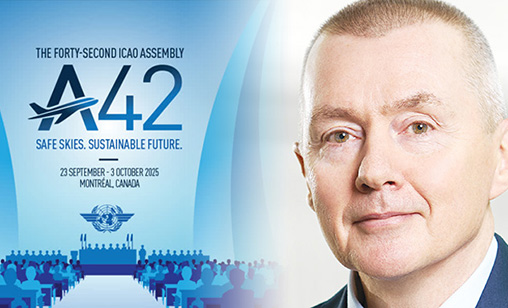News
Aiming high at ICAO Assembly
The International Air Transport Association (IATA) has high expectations for the 42nd Assembly of the International Civil Aviation Organization (ICAO) to be held in Montreal from late September to the first week of October. ICAO has accepted 14 working papers authored by IATA covering a wide range of topics for the Assembly’s consideration.
August 1st 2025
“IATA will be participating in the ICAO Assembly with safety, sustainability and efficiency at the top of our priority list,” said IATA director general, Willie Walsh, in comments in the week before the assembly conference convenes. Read More »
“It is critical we secure stronger support for Sustainable Aviation Fuel (SAF) and CORSIA as key enablers of aviation’s commitment to achieve net zero emissions by 2050. Equally, we need agreement to follow the principles and provisions of the Chicago Convention to avoid patchworks of debilitating tax measures and passenger rights regulations,” he said.
 |
“And we must shore-up safety with timely accident reports, mitigations for GNSS interference and preservation of critical radio-frequency spectrum.”
Criticality of global standards to global aviation cannot be underestimated. “I am optimistic for the outcomes of this Assembly. Everybody wants flying to be safe, efficient and more sustainable. So, we have a common agenda with governments,” Walsh said.
“Indeed, many of our submissions to the Assembly are simply asking governments to more effectively implement what they have agreed.
“The coming weeks in Montreal are essential to set the agenda, but even more important are the following three years of work to achieve what is agreed.”
Among its papers submitted to the conference, IATA has asked States to protect safety critical frequencies used by aviation from interference, strengthen coordination among telecoms and aviation regulators to ensure safety of flight, follow best practices of successful implementations and agree realistic timelines for any retrofits.
On the growing problem of GNSS interference, IATA said jamming and spoofing incidents are rising in areas near conflict zones. While redundancies exist to preserve safety of flights, this is an unacceptable risk which must be mitigated. It wants better coordination between military and civil aviation authorities to provide airlines with timely risk information.
And the support of “a multi-faceted approach to mitigating risks, including better reporting/detection, measures to protect critical aviation frequencies, the development of interference-proof avionics and a cyber-hardening strategy, contingency planning and training (pilots and air traffic controllers)”.
IATA supports increasing the retirement age for pilots from 65 to 67, “retaining the existing cockpit safeguard of at least one pilot under 65 and pairing the change with stronger, standardized medical oversight. This reflects longer, healthier careers while keeping safety safeguards in place”, IATA said.